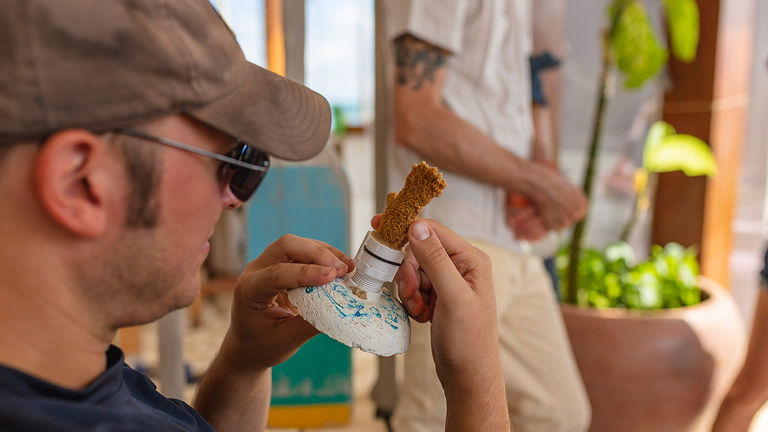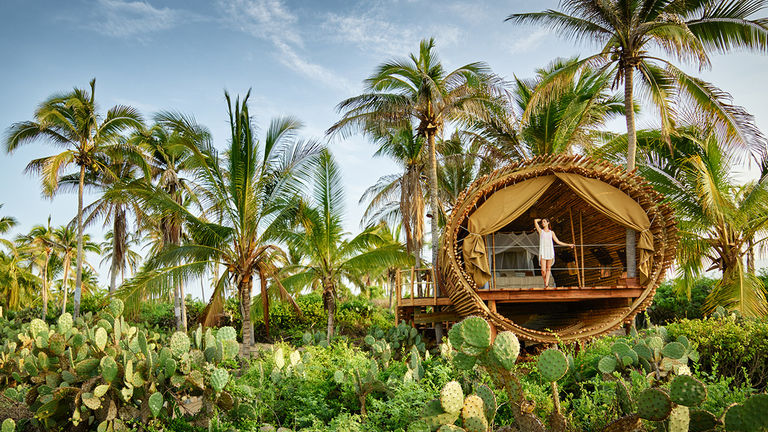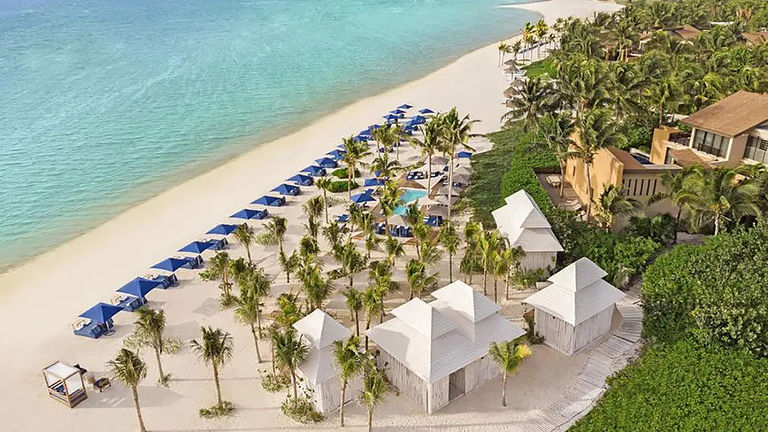As tourism continues to rebound, there are concerns growing about the negative effects of overtourism. Thankfully, in Mexico, there are many ways to support sustainability efforts while enjoying a memorable vacation.
When it comes to sustainability Mexico, the highest-profile eco-friendly offerings are found in the hospitality industry. But there are other ways to learn about and support efforts, as well. Mexican airlines Aeromexico and Volaris, for example, provide clients the option to offset their carbon footprint by making a voluntary donation.
Meanwhile, tour operators with a focus on the planet’s health include Impact Destinations, an “eco luxury” operator that will launch its first itineraries in Mexico later this year. Its philanthropic Mexico City tour will explore the history of the region while supporting the preservation of floating chinampa gardens and also teaching participants about the endangered axolotl salamander. Tours are led by a scientist who is also the founder of REDES, a nonprofit organization that supports conservation programs.
With a bit of research, it’s easy for travel advisors to find hotels for clients around Mexico that follow ever-stricter sustainability guidelines and, in some cases, provide opportunities for guests to actively participate in eco-friendly initiatives.
Here, we’ve rounded up some of our favorite ways that travelers can support sustainability during a Mexico vacation.
 Guests of Andaz Mayakoba can learn about coral reef rehabilitation.
Guests of Andaz Mayakoba can learn about coral reef rehabilitation.
Credit: 2023 Andaz MayakobaSustainability on the Pacific Coast
In Los Cabos, Waldorf Astoria Los Cabos Pedregal has its own Green Committee that monitors the property’s environment-focused efforts, which include waste separation, reduced water and energy consumption programs, and sea turtle conservation.
In Todos Santos, Hotel San Cristobal Baja — a beachfront boutique hotel that belongs to the Bunkhouse hotel group — follows a sustainability strategy that includes waste separation and a restaurant menu based on produce from the hotel’s garden, as well as catches by local fishermen. In addition, the property composts organic waste and donates leftover meat from the restaurant to local farms to feed hogs.
Near Zihuatanejo, Playa Viva also emphasizes organically grown products and local ingredients. The property earned a B Corp Certification for its efforts to promote and create biodiversity and positively impact the local community.
 Playa Viva, which has a B Corp Certification, places a focus on local ingredients and organic products.
Playa Viva, which has a B Corp Certification, places a focus on local ingredients and organic products.
Credit: 2023 Playa VivaStill to come in the eco-minded hospitality scene is Xala, a 3,000-acre luxury development in Costalegre, south of Puerto Vallarta. Slated to open in late 2024 with two as-yet-unnamed boutique hotels, the development will feature nearly 600 acres of restored land and a protected natural area spanning more than 1,200 acres, with a goal to help protect and restore the Chalacatepec and Xola-Paraman estuaries, both of which are important habitats for migratory birds.
Sustainability in the Mexican Caribbean
In the Mexican Caribbean, meanwhile, both Waldorf Astoria Cancun and Hilton Cancun, an All-inclusive Resort have multiple environmental programs that include reforestation and responsible gardening practices.
Iberostar Group has implemented a companywide sustainability initiative at all of its Mexico properties, with an overall goal to become carbon neutral by 2030. Additionally, the hotel chain serves fish and other seafood exclusively from Marine Stewardship Council- and Aquaculture Stewardship Council-certified fisheries and fish farms at its properties, as well as offers activities at select properties through kids’ club Star Camp to help children learn about activities such as recycling.
Farther south, Grand Residences Riviera Cancun in Puerto Morelos has its own water treatment facility and has reduced the use of plastic by offering reusable cups and pitchers throughout the property. Nearby, Sandos Caracol operates both a plant nursery that helps reproduce endangered palm tree species, and a mini-farm that’s home to rescue animals. Guests can participate in activities such as the plant-a-tree program and guided nature walks.
 Banyan Tree Mayakoba holds Preferred by Nature certification.
Banyan Tree Mayakoba holds Preferred by Nature certification.
Credit: 2023 Banyan Tree MayakobaOne of the region’s biggest hubs for upscale, eco-friendly accommodations is the 595-acre Mayakoba luxury resort complex. The staff includes biologists, geologists and engineers who work to protect the property's ecosystem, which includes more than 145 acres of mangroves. In addition, all four hotels at Mayakoba — Andaz Mayakoba, Banyan Tree Mayakoba, Fairmont Mayakoba and Rosewood Mayakoba — hold Preferred by Nature certification in recognition of their sustainable practices. Guests staying at Mayakoba properties can get involved in sustainability efforts in various ways, including by donating $1 for every night’s stay to the Sancus Foundation, an organization focused on conservation.
Each of the development’s properties offers unique sustainability activities for guests. Banyan Tree Mayakoba, for example, arranges activities such as a paper recycling workshop, sand dune conservation and coral reef restoration, an excursion that includes a catamaran ride and a coral farming activity hosted by Oceanus AC, an organization that has planted more than 60,000 coral colonies in the Gulf of Mexico and the Mexico Caribbean since 2014.
The marine sustainability efforts continue at Andaz Mayakoba Resort Riviera Maya, where activities include sea turtle conservation activities and visits to La Casita del Agua, an environmental center that hosts environmental activities. Guests can even meet with one of the resort’s marine biologists to learn about coral reef rehabilitation and help decorate the concrete bases used to hold the coral.